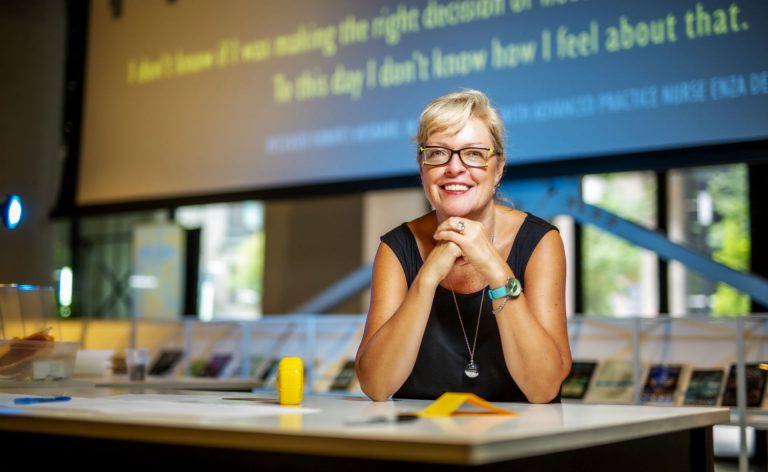Hybrid Minds/Hybrid Bodies looks at heart transplants from artistic, scientific and cultural perspectives

Heart transplantation is not a new or even particularly rare medical procedure. It is estimated that between 4,000 and 4,500 transplants are performed worldwide every year. Though the operation itself is well-understood, its long tail — physical, mental and emotional — remains largely hidden from the public’s imagination.
A new symposium and exhibition at Concordia’s 4TH SPACE is hoping to change that.
Co-organized by Ingrid Bachmann, a professor in the Department of Studio Arts, the Hybrid Minds/Hybrid Bodies project is more than just another art show. It is an interdisciplinary initiative involving individuals from fields as diverse as the arts, ethics, social sciences, hard sciences and medicine in a unique way.
Together they are exploring the connections linking donor families to recipients as well as the place heart transplantation occupies in our culture. The symposium and exhibition takes place from August 7 to 9.
Medicine meets art
The project dates back to 2007, when a team of health professionals led by Heather Ross, director of the Cardiac Transplant Program at Toronto’s University Health Network, began working on a research study into the process of transplanted heart incorporation.
“They were all curious about the non-medical effects of heart transplantation that they were witnessing in recipients,” says Bachmann.
“From a medical or hard science standpoint, the transplantation was seamless, and they were happy with the quality of life services they were receiving. But when they got to the clinic or talked to nurses, they displayed a lot distress through gestures or body language.”
To help the recipients express that distress, the researchers turned to artists.
“This was really one of the early, unique art-medical, art-science projects where the scientific community reached out to the arts community,” Bachmann adds.
The first phase of the project, which looked at the process of incorporating a transplanted heart, wrapped up in 2016. This second phase will look at the relationship — or lack of one — between heart donors’ families and the recipients.
“What’s come out in this second period of research is the realization that there needs to be some sort of registry of donors and recipients, similar to what we have for adoption in Canada,” explains Bachmann.
“There is a very big need for one. For many people, it would greatly help with their healing or with their feelings of loss and trauma.”
‘An exhibition of a process’
The exhibition and symposium will feature art works and creative projects that incorporate art-medical research and will focus on donor families’ experiences.
Additionally, there will be a reading room, with a selection of fiction, anthropology and medical texts, talks, videos and curated artifacts, including heart-shaped gifts recipients send to their medical teams and the medals or necklaces organ procurement agencies give to donors.
“There will also be elements from pop culture, like sensational National Enquirer headlines claiming recipients were turned into sex fiends, as well as playing cards and other items,” Bachmann says.
“We have the scientific discourse, the culturally acceptable discourse, and from pop culture we’ll have some of the fears.”
There will also be sketchbooks and notebooks on display, so that visitors will be able to understand how the artists brought their work from idea to creation.
“This is not only an exhibition of art work, it’s an exhibition of a process,” says Bachmann. “In some ways it’s more of a cultural exhibition.”
Find out more about the Hybrid Minds/Hybrid Bodies exhibition and symposium, taking place August 7 to 9 at Concordia’s 4TH SPACE (1400 De Maisonneuve Blvd. W.).



